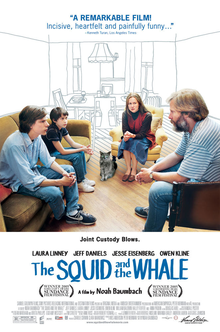
Once again we’re going at this from the opposite direction, having first seen and liked Frances Ha and only now going back to the film that first made director Noah Baumbach famous. Baumbach’s frequent collaborator Greta Gerwig is absent for this one but there are plenty of other recognizable faces even if you might not be able to name some of them.
After a prolonged period of rockiness in their marriage, Bernard and Joan Berkman have decided to separate and share joint custody of their two sons Walt and Frank. Bernard was once a prominent novelist but after not having had any new books published for many years is now more a teacher. Joan started writing only recently but is due to have her first book published soon. The older Walt plainly takes more after Bernard and blames Joan for the separation. The younger Frank prefers to spend time with Joan and is antagonistic towards Bernard. The stress of having to switch between the two houses of their parents takes a toll on both boys who act out in different ways. Frank for example develops the habit of masturbating and then spreading his semen out in public while Walt has to decide how serious he is with his new girlfriend and has trouble reconciling with the fact that he isn’t quite as artistically creative as he sees himself being.
As with Frances Ha, this is another film in which seemingly nothing much of consequence happens, but the drama of ordinary life alone makes it an incredibly compelling watch. Instead of following a single point of view character, all four family members share equal billing which makes sense as you can see how they shape and influence each other. Both boys inherit mannerisms of speech and behavior from their parents even the one that they have a poor relationship with. So Bernard’s need to always have the upper hand in any contest no matter how trivial makes his sports games against Frank a serious matter, leading Frank to adopt Bernard’s habit of swearing when things don’t go his way. It’s a rich and fascinating psychological study of these characters and their mutual influences. It’s notable for example how Frank starts taking on the speech habits of his tennis coach Ivan once Joan acknowledges that he is her boyfriend.
One possible weakness is that while the film presents each character as a rounded, complex person, there’s no attempt to give Bernard any redeeming qualities whatsoever and his pettiness is evident from the first scene we see him in. He’s a fun character to watch with his constant need to dismiss others for not being intellectual enough or not having enough culture appreciate art. It’s also understandable that Walt looks up to him and the older boy’s realization that his father has feet of clay is perhaps the best moment in the film. But the film goes out of its way to bash Bernard in unrelated ways as well, such as how he is a cheapskate or that he’s a bit of a lecher, which seems excessive and petty. At the same I have to admit that these unusual quirks including the fact that Joan does seem to have a problem with being sexually promiscuous are part of what makes this such a distinctive film.
One thing I’ve found that I like about Baumbach’s films is that they’re relatively short. They’re just long enough to let us know what makes these characters tick and there’s no attempt to drag out the drama. The dialogue is well written, the interactions entertaining and the psychological insight on display is impressive. All told, this is a great film in a compact package that I would recommend highly.
One thought on “The Squid and the Whale (2005)”